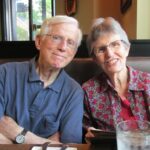What do you do when the world turns upside down? You can always sense the right next step by connecting to your spiritual intuition.
Last January, we celebrated my birthday with a trip to New York City to see the musical Hamilton with my daughter and her partner. Before the show, the four of us crowded around a small table at a Korean restaurant. After dinner, we threaded our way through ebullient crowds, brushing elbows with dozens of people to get to our seats in the packed theater. The performance was wonderful—an evening to remember.
None of us knew about the disease outbreak developing in China. Less than six weeks later, Broadway went dark. We went into lockdown. As Lin Manuel Miranda wrote in the chorus of The Battle of Yorktown, “The world turned upside down.”
Lin Manuel was honoring the legend that British soldiers sang a folk song called “The world turned upside down” as they surrendered to the Continental Army. In reality, though, the phrase is straight out of the Old Testament. That fits: as a friend commented to me recently, “These are biblical times.”
We are dealing with conflicts and challenges of an epic scope and scale. In the midst of all the global suffering, my life as an individual seems like such a trivial thing. My perspective gets skewed. I feel confused, wondering how I should focus my energy. I need to put one foot in front of the other: to work, eat, and sleep. At the same time, it feels like I’m doing all that inside a burning building.
Maintaining sanity in a world turned upside down
I find I need more time than usual simply to process all this. If I skimp on that kind of time, I start slipping up: a scheduling mistake here, a weird memory glitch there, a general feeling of being ragged around the edges. Those signs have been cropping up lately. So I’ve cleared my schedule for next week.
I will rest, get outside, take care of stuff that has piled up over the past few months. I will “go a little think,” as Einstein put it. Most importantly, I will connect to that delicate thread of inner knowing that I call spiritual intuition. It’s the only way I know to stay sane when the world turns upside down.
What can I do to help? So many worthy causes demand my attention. How do I balance my commitments so I can contribute? How far should I push my limits as I attempt to respond? These are the questions I need to sit with.
Crises drive us to spiritual practice
Martin Luther King often said in his speeches that “the arc of the universe is long, but it bends towards justice”—a quotation that originated in the 1850s with a Unitarian minister named Theodore Parker. Being an optimist, I want to agree with Parker and King. But I’m concerned about the passivity of the phrase. Justice isn’t some abstract thing that bends itself. We have to bend it. It’s in our hands. We can vote. We can speak up. We can spend our money in ways that support our values.
But what if I do all that, and the arc still doesn’t bend in my lifetime? I may do everything I’m capable of to create change, and never see the results I want to see. On tough days, this reality threatens to push me off the cliff and into overwhelm. But I’ve fallen into that chasm before and I know what lies at the bottom: the passivity of despair.
I can’t let myself go there. The one sure antidote is to open myself to receive spiritual guidance, listen to what comes, then muster the courage to act on it. These days, I’m hearing something like this:
For you, an oppositional stance is not going to work. You have to create a big enough space in yourself to hold the whole crazy thing—all the problems, all the maddening, destructive actions, all the behaviors you so want to judge. You have to have the courage to let it be exactly as it is, and to find a way to transcend your own judgments so you can hear and respect all sides.
My spiritual intuition most often floats up as a kind of inner knowing, which I can translate into words. Yours may show up in a different way, and will certainly say different things. Whatever form our spiritual intuition takes, though, it’s an empowering force: when we connect to this inner truth, we also begin to connect to the resources we need to live that truth.
An example of connecting to resources
Having gotten the inner assignment to “find a way to hear and respect all sides,” I’ve already begun to receive the resources I need to do that. For example, I was drawn last week to watch RBG, the fascinating documentary about Justice Ruth Bader Ginsburg. Justice Ginsburg was a brilliant student of the law who worked tirelessly to uphold the Constitution. And I mean “tirelessly:” she worked on briefs and opinions until 4 or 5 A.M. most weeknights, settling for a quick nap before returning to the court for a 9 A.M. court session.
In that regard, Justice Ginsburg was a horrible role model for me: I’d have a nervous breakdown within a month on her sleep schedule, if not sooner. But I do aspire to emulate her overall approach to change. She worked over the long term to change hearts and minds.
Justice Ginsburg’s vehicle was the law. Learning more about her life helped me see that my vehicles are listening, writing, and spiritual practice: working to overcome my own judgments so I can “hold the whole thing.”
But is this a cop-out? What about activism? What about protests and demonstrations? These are equally essential parts of the change puzzle. But Ruth Bader Ginsburg rarely raised her voice, or marched in protests. Neither have I. Contributing in these ways is not one of my strengths. Does that make me passive or weak?
“Kind and respectful” does not mean “a pushover”
As an HSP, I don’t fare well in confrontational situations: direct conflict leaves me overaroused, sending me “down for the count.” But I don’t want to be a doormat either. I don’t want to stand silently to the side watching, while things happen that I feel are wrong. I think that’s why I felt so inspired by another resource I found recently: a documentary called White Right: Meeting the Enemy (available to stream on Netflix.)
Filmmaker Deeyah Khan traveled around the U.S. to interview leaders and active members of the white supremacy and neo-Nazi movements, to understand more deeply the source of their hatred for Muslims. Khan’s clarity, empathy, and courage had an extraordinary effect on her interview subjects, as you’ll see if you watch the film.
But this transformation did not happen by magic. In an interview with Simon Sinek, Khan speaks movingly about the effort it took for her to stay connected to the humanity of these men, whose organizations had threatened her life. Again and again she’d ask herself, “Can I find a way of understanding them as human beings behind the rhetoric, behind the chest beating, and the ideology and all of that, behind the threats?”
Every time she went into an interview, Khan had to reaffirm her intent. She knew what she didn’t want:
…I was also quite conscious about how I was wanting for these conversations to go. I did not want it to be, “I’ll tell you all my politics and all my views and I will pat myself on the back for having all the correct views, then you get to shout your stuff and then we all wipe our hands and we all go off.”
What she did want was to listen. No one was making her listen: she chose to do it, and she chose to do the hard work of setting aside her own judgments. The results were powerful. I found this incredibly inspiring. It reminded me that everything has its place: protest and physical opposition. The law. And listening to each other. We need all of them, and each of us can find the way in which we can best contribute.
How to stay sane when the world turns upside down
Ruth Bader Ginsburg was known for treating everyone around her with kindness and respect, as she toiled to transform the legal landscape in support of gender equality. Similarly, Deeyah Khan managed to genuinely befriend many of the men she interviewed, while directly confronting them with the violent effects of their beliefs. Encountering each of these women and their work has helped me better recognize the style of contribution that best resonates for me.
Who inspires you these days? What kind of action do you feel drawn to? Right action emerges from your connection to a deep sense of clarity and conviction. Each of us has that sense. We simply need to cultivate it.
To do so, make a daily practice of connecting to your spiritual intuition. What is real, and what is merely a reflection with no permanent substance? How do you tell the true clouds from the reflected ones? What is your path forward? Ask. Listen. Act. Observe the results and adjust your course. Have courage, knowing it’s up to each of us to bend the arc towards justice…and that each of us has the power to discover, moment by moment, our unique part in that all-important effort.
Image: ©2020 Emily Agnew




















Hey Emily, hope you’re well! I read your article this morning. As always, it comes full circle. Relevant, thorough, complete. I wanted to add a suggestion, if I may. Yesterday, I attended an – online – conference on the cultural genocide of our First Nations here in Canada. As many people usually want to know what they can do now to counter-act racism and repair some of damage, or at least help the cause, she offered a lovely suggestion, which may appeal to many HSPs: it’s to see, listen, watch their “expression de leur identités culturelles”. See their art, listen to their music and songs, watch their movies. This way, we can share their culture, hear their stories, appreciate and validate them. I thought it was a very smart suggestion.
Anne Marie, thank you so much for taking time to share this. It is indeed a lovely, and important, suggestion to take in and appreciate the cultural identities of groups that have been marginalized or subject to violence and prejudice….and as you say, something that would appeal to many HSPs. Thank you.